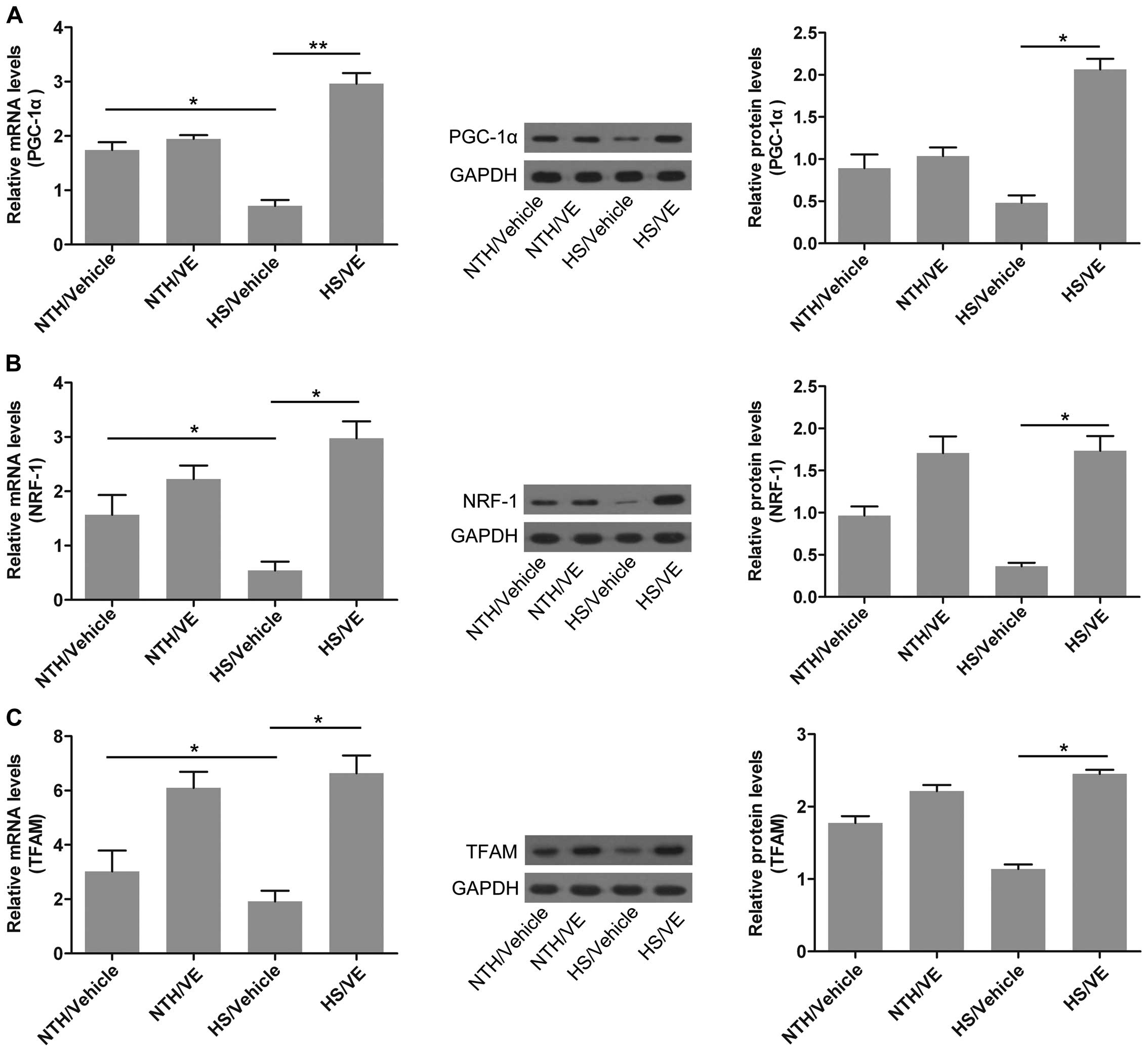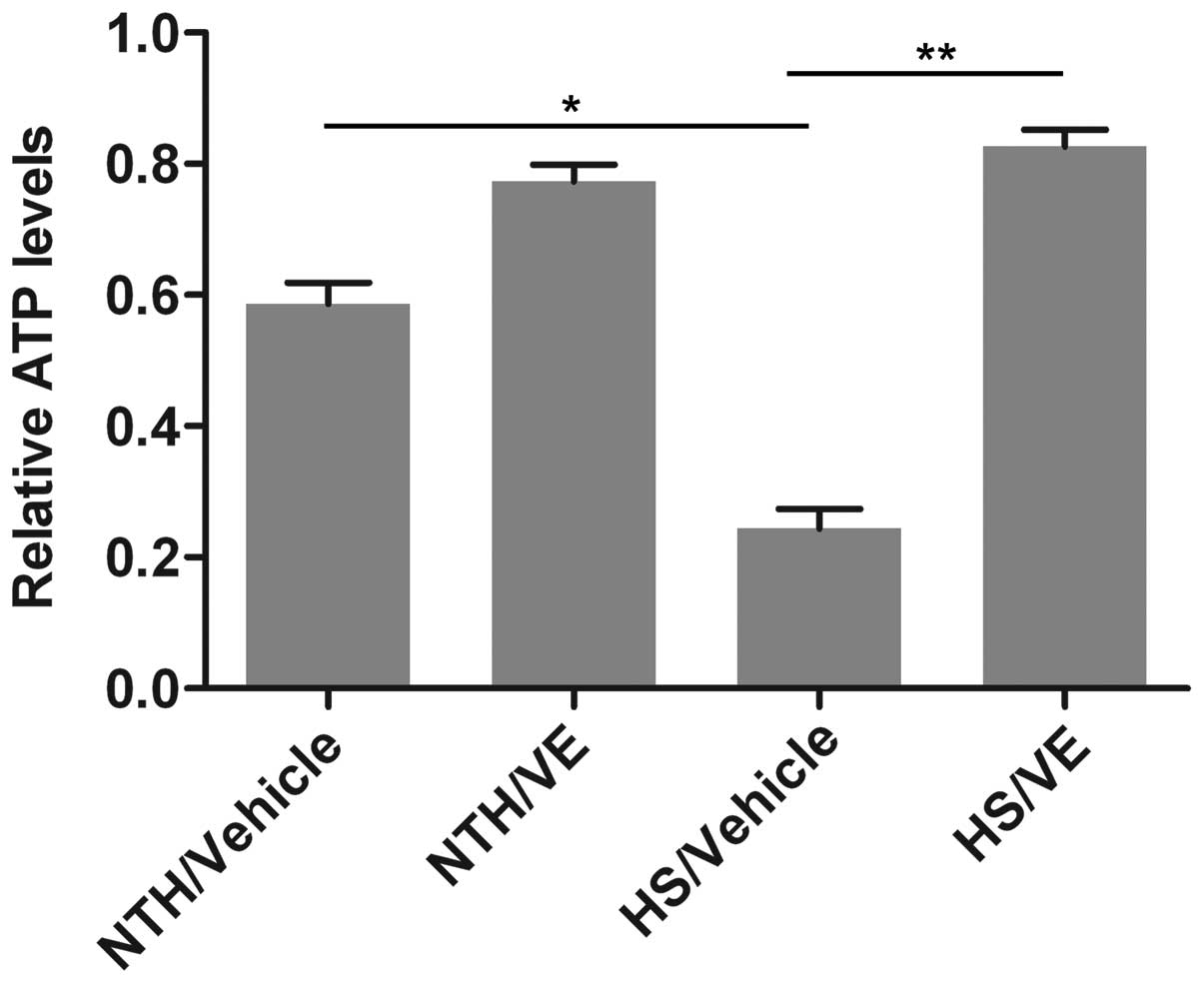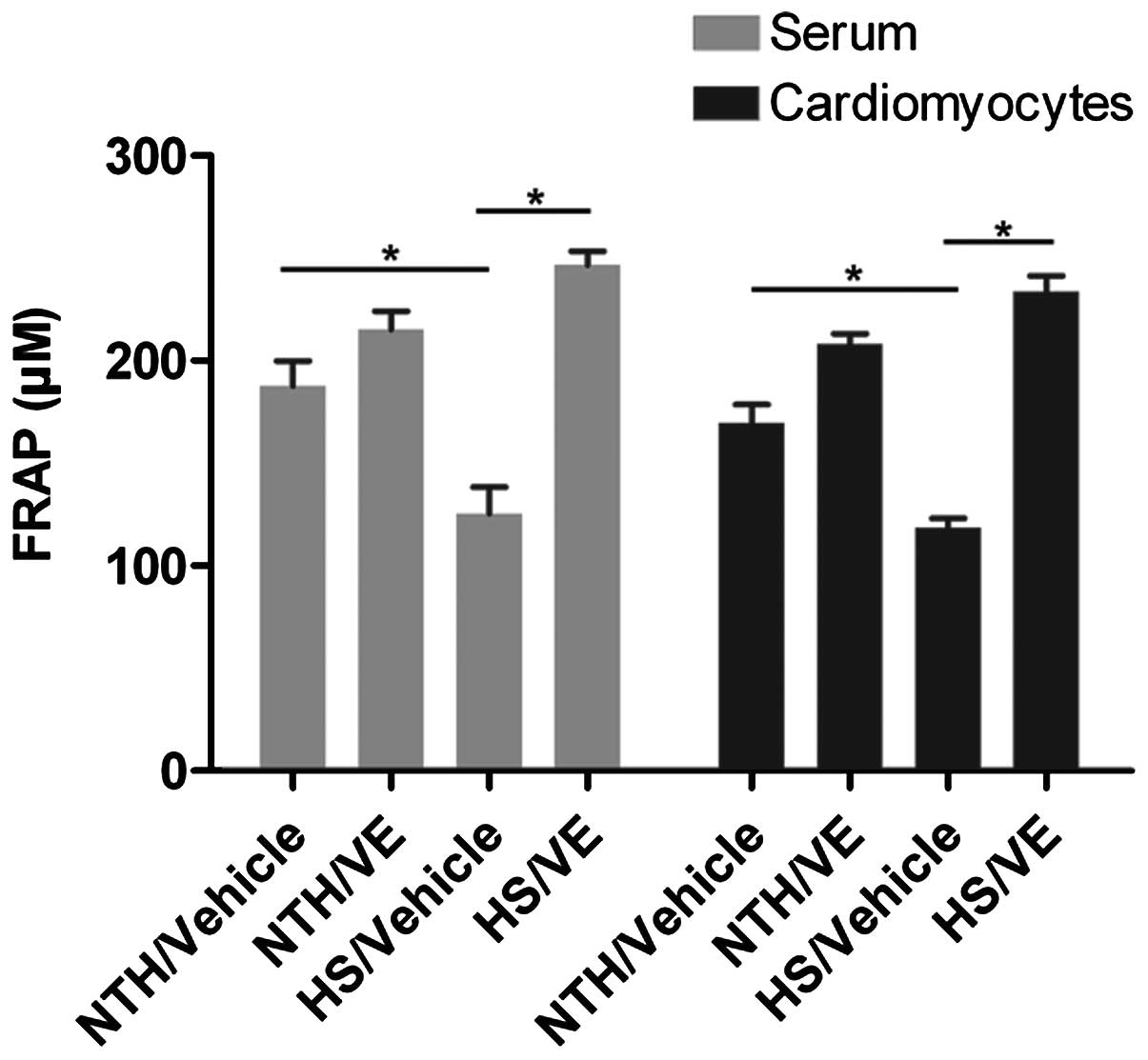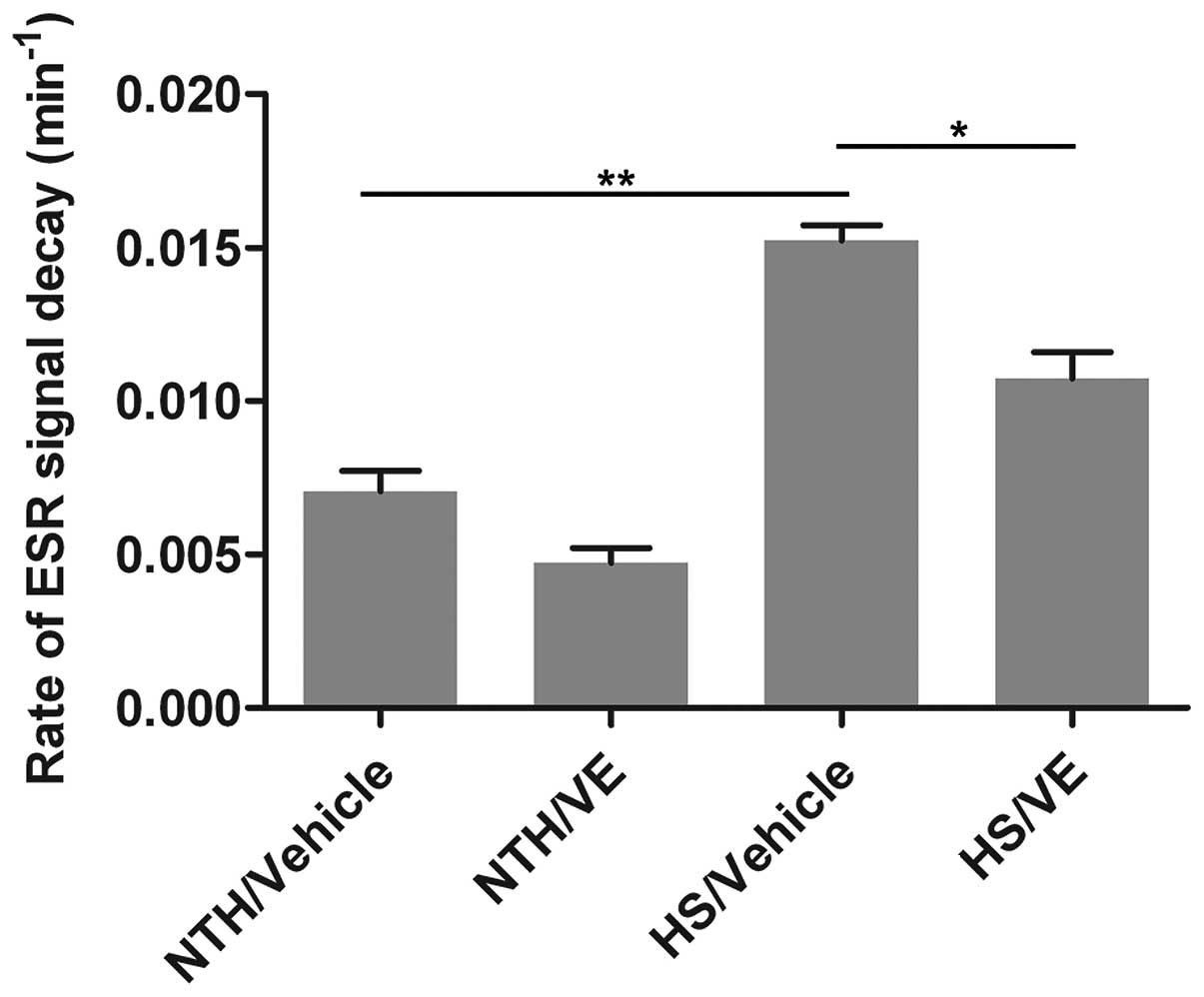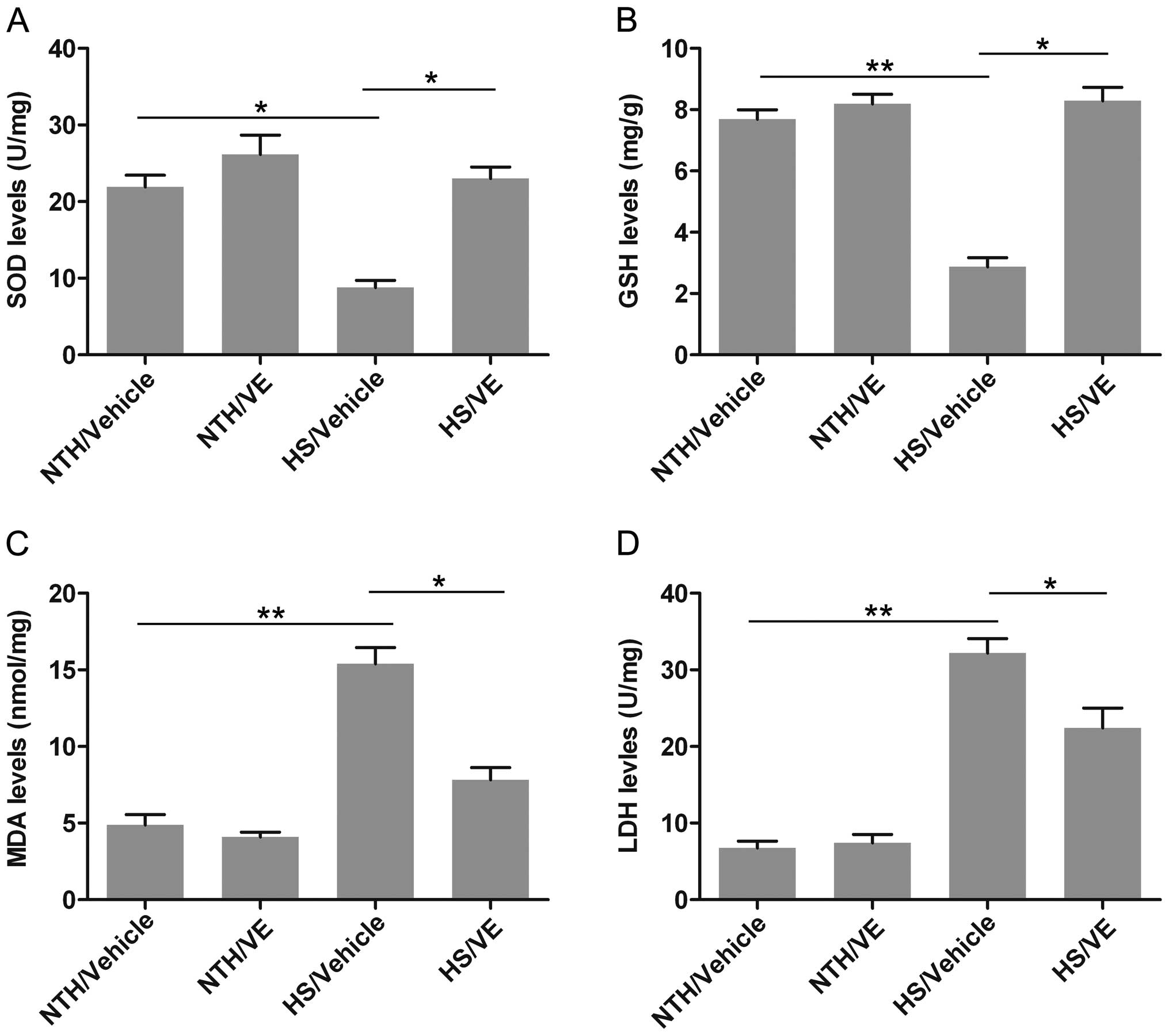|
1
|
Bouchama A and Knochel JP: Heat stroke. N
Engl J Med. 346:1978–1988. 2002. View Article : Google Scholar : PubMed/NCBI
|
|
2
|
Chien KR: Genomic circuits and the
integrative biology of cardiac diseases. Nature. 407:227–232. 2000.
View Article : Google Scholar : PubMed/NCBI
|
|
3
|
Qian L, Song X, Ren H, Gong J and Cheng S:
Mitochondrial mechanism of heat stress-induced injury in rat
cardiomyocyte. Cell Stress Chaperones. 9:281–293. 2004. View Article : Google Scholar : PubMed/NCBI
|
|
4
|
Carreira RS, Lee P and Gottlieb RA:
Mitochondrial therapeutics for cardioprotection. Curr Pharm Des.
17:2017–2035. 2011. View Article : Google Scholar : PubMed/NCBI
|
|
5
|
Kyrychenko V, Poláková E, Janíček R and
Shirokova N: Mitochondrial dysfunctions during progression of
dystrophic cardiomyopathy. Cell Calcium. 58:186–195. 2015.
View Article : Google Scholar : PubMed/NCBI
|
|
6
|
Hall DM, Buettner GR, Oberley LW, Xu L,
Matthes RD and Gisolfi CV: Mechanisms of circulatory and intestinal
barrier dysfunction during whole body hyperthermia. Am J Physiol
Heart Circ Physiol. 280:H509–H521. 2001.PubMed/NCBI
|
|
7
|
Ray PD, Huang BW and Tsuji Y: Reactive
oxygen species (ROS) homeostasis and redox regulation in cellular
signaling. Cell Signal. 24:981–990. 2012. View Article : Google Scholar : PubMed/NCBI
|
|
8
|
Wang X, Yuan B, Dong W, Yang B, Yang Y,
Lin X and Gong G: Humid heat exposure induced oxidative stress and
apoptosis in cardiomyocytes through the angiotensin II signaling
pathway. Heart Vessels. 30:396–405. 2015. View Article : Google Scholar
|
|
9
|
Wang X, Yuan B, Dong W, Yang B, Yang Y,
Lin X and Gong G: Induction of heat-shock protein 70 expression by
geranylgeranylacetone shows cytoprotective effects in
cardiomyocytes of mice under humid heat stress. PLoS One.
9:e935362014. View Article : Google Scholar : PubMed/NCBI
|
|
10
|
Jäättelä M, Wissing D, Kokholm K, Kallunki
T and Egeblad M: Hsp70 exerts its anti-apoptotic function
downstream of caspase-3-like proteases. EMBO J. 17:6124–6134. 1998.
View Article : Google Scholar : PubMed/NCBI
|
|
11
|
Coyle P, Philcox JC, Carey LC and Rofe AM:
Metallothionein: the multipurpose protein. Cell Mol Life Sci.
59:627–647. 2002. View Article : Google Scholar : PubMed/NCBI
|
|
12
|
Fukase Y, Tsugami H, Nakamura Y, Ohba K
and Ohta H: The role of metallothionein and metal transporter on
cadmium transport from mother to fetus. Yakugaku Zasshi.
134:801–804. 2014.In Japanese. View Article : Google Scholar
|
|
13
|
Zhao XL, Li YK, Cao SJ, Hu JH, Wang WH,
Hao RJ, Gui LS and Zan LS: Protective effects of ascorbic acid and
vitamin E on antioxidant enzyme activity of freeze-thawed semen of
Qinchuan bulls. Genet Mol Res. 14:2572–2581. 2015. View Article : Google Scholar : PubMed/NCBI
|
|
14
|
Peng L: Mice brain tissue injury induced
by diisononyl phthalate exposure and the protective application of
vitamin E. J Biochem Mol Toxicol. 29:311–320. 2015. View Article : Google Scholar : PubMed/NCBI
|
|
15
|
Das A, Xi L and Kukreja RC:
Phosphodiesterase-5 inhibitor sildenafil preconditions adult
cardiac myocytes against necrosis and apoptosis. Essential role of
nitric oxide signaling. J Biol Chem. 280:12944–12955. 2005.
View Article : Google Scholar : PubMed/NCBI
|
|
16
|
Ye G, Metreveli NS, Ren J and Epstein PN:
Metallothionein prevents diabetes-induced deficits in
cardiomyocytes by inhibiting reactive oxygen species production.
Diabetes. 52:777–783. 2003. View Article : Google Scholar : PubMed/NCBI
|
|
17
|
Wang GW, Klein JB and Kang YJ:
Metallothionein inhibits doxorubicin-induced mitochondrial
cytochrome c release and caspase-3 activation in cardiomyocytes. J
Pharmacol Exp Ther. 298:461–468. 2001.PubMed/NCBI
|
|
18
|
Liang H and Ward WF: PGC-1alpha: a key
regulator of energy metabolism. Adv Physiol Educ. 30:145–151. 2006.
View Article : Google Scholar : PubMed/NCBI
|
|
19
|
Gleyzer N, Vercauteren K and Scarpulla RC:
Control of mitochondrial transcription specificity factors (TFB1M
and TFB2M) by nuclear respiratory factors (NRF-1 and NRF-2) and
PGC-1 family coactivators. Mol Cell Biol. 25:1354–1366. 2005.
View Article : Google Scholar : PubMed/NCBI
|
|
20
|
Ikeda M, Ide T, Fujino T, Arai S, Saku K,
Kakino T, Tyynismaa H, Yamasaki T, Yamada K, Kang D, et al:
Overexpression of TFAM or twinkle increases mtDNA copy number and
facilitates cardioprotection associated with limited mitochondrial
oxidative stress. PLoS One. 10:e01196872015. View Article : Google Scholar : PubMed/NCBI
|
|
21
|
Slimen IB, Najar T, Ghram A, Dabbebi H,
Ben Mrad M and Abdrabbah M: Reactive oxygen species, heat stress
and oxidative-induced mitochondrial damage. A review. Int J
Hyperthermia. 30:513–523. 2014. View Article : Google Scholar : PubMed/NCBI
|
|
22
|
Huang C, Jiao H, Song Z, Zhao J, Wang X
and Lin H: Heat stress impairs mitochondria functions and induces
oxidative injury in broiler chickens. J Anim Sci. 93:2144–2153.
2015. View Article : Google Scholar : PubMed/NCBI
|
|
23
|
Steenland K: Epidemiology of occupation
and coronary heart disease: research agenda. Am J Ind Med.
30:495–499. 1996. View Article : Google Scholar : PubMed/NCBI
|
|
24
|
Havenith G, Luttikholt VG and Vrijkotte
TG: The relative influence of body characteristics on humid heat
stress response. Eur J Appl Physiol Occup Physiol. 70:270–279.
1995. View Article : Google Scholar : PubMed/NCBI
|
|
25
|
Lane RK, Hilsabeck T and Rea SL: The role
of mitochondrial dysfunction in age-related diseases. Biochim
Biophys Acta. 1847:1387–1400. 2015. View Article : Google Scholar : PubMed/NCBI
|
|
26
|
San Martín A, Du P, Dikalova A, Lassègue
B, Aleman M, Góngora MC, Brown K, Joseph G, Harrison DG, Taylor WR,
et al: Reactive oxygen species-selective regulation of aortic
inflammatory gene expression in Type 2 diabetes. Am J Physiol Heart
Circ Physiol. 292:H2073–H2082. 2007. View Article : Google Scholar : PubMed/NCBI
|
|
27
|
Lassègue B and Griendling KK: Reactive
oxygen species in hypertension; An update. Am J Hypertens.
17:852–860. 2004. View Article : Google Scholar : PubMed/NCBI
|
|
28
|
Nordberg J and Arnér ES: Reactive oxygen
species, antioxidants, and the mammalian thioredoxin system. Free
Radic Biol Med. 31:1287–1312. 2001. View Article : Google Scholar : PubMed/NCBI
|
|
29
|
Halliwell B and Cross CE: Oxygen-derived
species: their relation to human disease and environmental stress.
Environ Health Perspect. 102(Suppl 10): 5–12. 1994. View Article : Google Scholar : PubMed/NCBI
|
|
30
|
Davies KJ: Oxidative stress: the paradox
of aerobic life. Biochem Soc Symp. 61:1–31. 1995. View Article : Google Scholar : PubMed/NCBI
|
|
31
|
Shirpoor A, Norouzi L, Nemati S and Khadem
Ansari MH: Protective effect of vitamin E against diabetes-induced
oxidized LDL and aorta cell wall proliferation in rat. Iran Biomed
J. 19:117–123. 2015.PubMed/NCBI
|
|
32
|
Takahashi M, Miyashita M, Park JH,
Kawanishi N, Bae SR, Nakamura Y, Sakamoto S and Suzuki K:
Low-volume exercise training and vitamin E supplementation
attenuates oxidative stress in postmenopausal women. J Nutr Sci
Vitaminol (Tokyo). 59:375–383. 2013. View Article : Google Scholar
|
|
33
|
Sakr HF, Abbas AM and El Samanoudy AZ:
Effect of vitamin E on cerebral cortical oxidative stress and
brain-derived neurotrophic factor gene expression induced by
hypoxia and exercise in rats. J Physiol Pharmacol. 66:191–202.
2015.PubMed/NCBI
|
|
34
|
Dziegiel P: Expression of metallothioneins
in tumor cells. Pol J Pathol. 55:3–12. 2004.PubMed/NCBI
|
|
35
|
Dziegiel P, Salwa-Zurawska W, Zurawski J,
Wojnar A and Zabel M: Prognostic significance of augmented
metallothionein (MT) expression correlated with Ki-67 antigen
expression in selected soft tissue sarcomas. Histol Histopathol.
20:83–89. 2005.
|
|
36
|
Pula B, Domoslawski P, Podhorska-Okolow M
and Dziegiel P: Role of metallothioneins in benign and malignant
thyroid lesions. Thyroid Res. 5:262012. View Article : Google Scholar
|
|
37
|
Surowiak P, Matkowski R, Materna V,
Györffy B, Wojnar A, Pudelko M, Dziegiel P, Kornafel J and Zabel M:
Elevated metallothionein (MT) expression in invasive ductal breast
cancers predicts tamoxifen resistance. Histol Histopathol.
20:1037–1044. 2005.PubMed/NCBI
|
|
38
|
Thirumoorthy N, Shyam Sunder A,
Manisenthil Kumar K, Senthil Kumar M, Ganesh G and Chatterjee M: A
review of metallothionein isoforms and their role in
pathophysiology. World J Surg Oncol. 9:542011. View Article : Google Scholar : PubMed/NCBI
|
|
39
|
Wojnar A, Pula B, Piotrowska A, Jethon A,
Kujawa K, Kobierzycki C, Rys J, Podhorska-Okolow M and Dziegiel P:
Correlation of intensity of MT-I/II expression with Ki-67 and MCM-2
proteins in invasive ductal breast carcinoma. Anticancer Res.
31:3027–3033. 2011.PubMed/NCBI
|
















